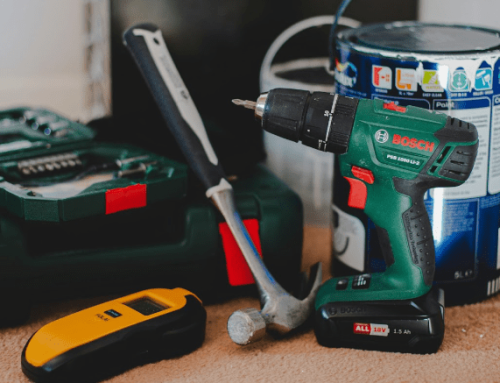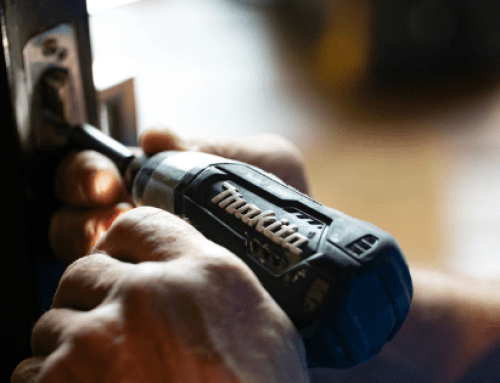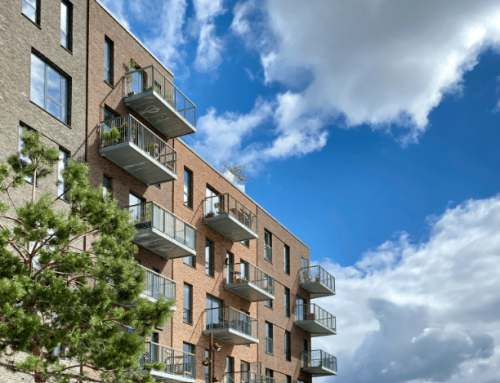Most people instantly think of what is known as a building surveyor when you say a surveyor of a property, i.e., someone who examines the actual condition of the home and spots problems like rising moisture, structural fissures and wobbly floors.
In its most basic form, this is indeed accurate, although in other instances, such as when valuing a home for a mortgage, the appraiser really concentrates on the general market value and does a property inspection to do so.
There were estimated to be approximately 56,100 chartered surveyors working in the United Kingdom as of 2022, compared with 68,700 in 2010, a decrease of around 12,600.
So, with the number of building surveyors dwindling, how can a landlord choose the right chartered surveyors to work and what is building surveying? We’re put together this handy guide for landlords with everything you need to know about building surveys.
What are building surveyors services in relation to block management?
A property manager can benefit from the building surveyor’s experience in regards to the structure, faults, structural difficulties, compliance with legislation, health and safety, fire, and other essential matters.
Building surveyors can provide advice on the work needed over a safe 15 or 20-year maintenance cycle. Provide advice on the expected lifespan of building components, and manage those expenses to cause the least amount of difficulty for flat owners.
Read The Complete Guide to Residential Block Management here.
What is a chartered building surveyor?
A chartered building surveyor offers expert guidance on real estate and building issues, thus they must be knowledgeable in a wide range of construction-related issues. This includes projects that involve the maintenance, renovation, alterations, and additions of residential apartment buildings and block properties.
Building surveyors assess problems, provide reports on them, and provide qualified counsel for the management of construction projects. The following are some possible tasks for a building surveyor:
- Produce guidelines
- Procure and manage contractual work
- Provide guidance on legal requirements like planning, building regulations and codes, or CDM
- Carry out a building survey
- Analyse construction flaws
A true building surveyor will assist in the technical analysis of the intricate details of a property’s construction, whether through a thorough survey or by later supervising any renovation projects. Even though such a survey might not be legally necessary for a property transaction for existing buildings, it can still be valuable to use one to determine the true condition of a property.
How can landlords work with building surveyors?
Knowing when a building surveyor is required and collaborating closely with them to achieve the overall goals of the property interest are the keys to successful property management. Having a list of completed tasks may be worthwhile, but when people and financial constraints are involved, the reality may be quite different.
Landlords should always make sure they are working with a company or individual with chartered surveyor status.
In light of this, the following are some important tips for partnering with a building surveyor and allowing them to supplement the regular management of the property:
Structural and internal inspections
Although it seems easy, the hustle and bustle of life and work is frequently overlooked. Although a building surveyor is perfectly capable of conducting a property inspection on their own, adding another skill set, such as property management, helps give the inspection some direction and purpose.
It need not last the entire inspection; it might be used as a type of debriefing at the conclusion or perhaps at the beginning to ensure that certain question areas are examined.
You can discuss solutions you’ve come up with on your own and offer feedback, such as if people in the house have noticed a water leak. You may even discuss certain people in the construction industry that you have previously worked with that you think would be the best for any maintenance or structural works.
Find Out More: Your Guide To Block Property Site Visits + Checklist
Discuss costs
Keep costs under control, including both those that directly relate to the building surveyor’s time and those that result from follow-up work. A specific charge should ideally be agreed upon up front, but you should be prepared for unforeseen delays or specialised mini-surveys from, say, a mechanical & architectural consultant.
However, it’s also worthwhile knowing that using chartered building surveyors can actually save you money!
Research suggests that having an effective surveying plan in place can have economic benefits such as limiting overheads and reducing equipment costs.
Read More: Rental Property Repairs vs Improvements: Why & When
Drafting building projects
It’s practical to request that the building surveyor deliver an outline of their findings first, which you may review and make any necessary changes to for the final version either jointly or independently.
This is more similar to a joint inspection in that you can provide new viewpoints and pointers from another property management perspective in addition to recognising any obvious questions or omissions.
This is particularly important for any kind of refurbishment, construction process or projects with historic buildings, which may have a different set of rules and regulations under local authorities compared to other buildings.
Professional advice
For a landlord or property manager, it will be important to fully understand the entire process that a building surveyor can be involved in.
On one hand, it may just be a standalone report or condition assessment on a single problem, and on the other, it might be a full project management of a significant renovation.
When in fact they will have the knowledge to manage actual contractor works to strict guidelines from local planning bodies, set expenditures, and health and safety issues like CDM, only the initial stage is frequently considered.
Energy Efficiency
One of the key areas where a building surveyor can provide significant value is in improving a property’s energy efficiency. Surveyors are equipped to conduct energy audits, identify inefficiencies, and recommend solutions such as better insulation, double glazing, or renewable energy installations.
By focusing on energy efficiency, not only can landlords reduce operational costs, but they can also increase the property’s appeal to environmentally conscious tenants. Energy-efficient properties typically have lower utility bills, which can be a major selling point in the rental market. Additionally, improving a property’s energy performance can increase its long-term value and help it comply with ever-tightening regulations on energy use.
Engaging a surveyor early to assess energy-related improvements can also prevent expensive retrofits later. Their expertise can ensure that proposed changes are both cost-effective and compliant with current standards, offering long-term benefits for both landlords and tenants.
Choosing the Right Building Survey
When choosing the right building survey for your property, it’s crucial to match the survey type to your specific needs. Here are some factors to guide your decision:
- Property Age and Type: The age, construction method, and overall condition of your property play a key role in selecting the appropriate survey. Older or more unusual properties often require a comprehensive building survey, while a HomeBuyer Report may be suitable for newer or more standard homes.
- Renovation Plans: If you plan to carry out extensive renovations, a detailed building survey can provide valuable insights into potential issues and necessary repairs, helping you make well-informed decisions before starting work.
- Specific Concerns: If you have particular worries about a property, such as dampness or structural issues, a specific defect survey may be the most suitable option to address those concerns directly.
Why should landlords or property owners work with building surveyors?
All leases contain provisions regarding the upkeep and general condition of the property. Both tenants and landlords are protected by these terms. However, professional assistance is frequently required when it comes to enforcing these provisions or ensuring that a property is being properly maintained.
An experienced building surveyor is invaluable in situations like these. They are able to conduct building surveys and other inspections and offer thorough reports (along with images) on the state of the building and any maintenance issues.
In light of this, getting a building survey completed at the beginning and end of any lease is a wise move to lower risk and provide peace of mind.
Looking for professional building surveying services?
Input from a building surveyor can be helpful in a variety of situations, from a thorough inspection to identify any building structure problems or building defects to subsequently successfully managing trickier building projects. Unfortunately, when things go well, you might not realise how important this is; nevertheless, when they don’t, either now or in the future, it will be priceless.
At Scanlans, our building surveyors with chartered status can plan project management of any major works needed as well as any maintenance programmes which can be carried out on an annual basis.
Our block management services cover everything from insurance and claims to repairs and maintenance, building surveying services, site visits, and more.
For more information about our services, or to get a quote, contact us today.
What is building surveying FAQs
What does a building surveyor do?
Building surveyors are in charge of evaluating the quality of all types of structures, including residential, public, and commercial buildings. They assess the state of buildings and offer suggestions for how to make them better.
What does a building survey check for?
They will pay close attention to the property’s structural integrity and search for maintenance problems like subsidence, shaky walls, a leaking roof, or a dangerous chimney chute. When it comes to protecting your property, they will also provide information on the kind of materials and glazing used.
How long does a building survey take?
The duration of a building survey depends on the size, age, and complexity of the property. For an average-sized residential property, a survey typically takes between 3 to 8 hours. However, larger or older buildings may require more time, especially if there are specific concerns or structural issues to investigate. After the physical survey, it may take an additional 5 to 10 working days for the surveyor to complete and deliver the final report.









